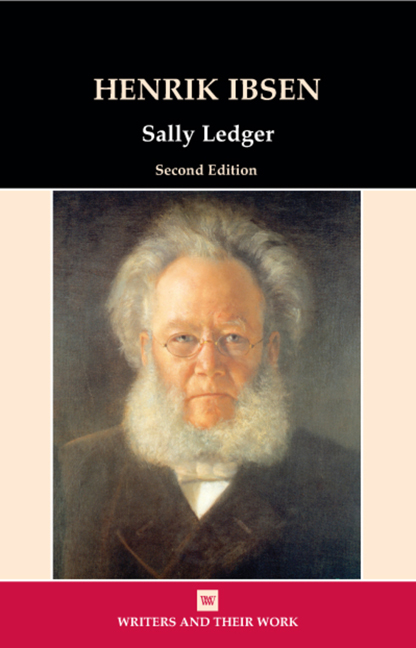Book contents
- Frontmatter
- Dedication
- Contents
- Acknowledgements
- Biographical Outline
- Note on Translations
- Abbreviations
- 1 Ibsenism and A Doll's House
- 2 Ibsen, Realism and ‘Modern’ Drama: From Norwegian Nationalism to Ghosts
- 3 Liberalism and its Discontents: Ibsen's Politics in An Enemy of the People
- 4 Ibsen's Women: The Lady from the Sea, Hedda Gabler and Little Eyolf
- 5 Ibsen, Freud and Psychological Drama: Rosmersholm and Peer Gynt
- 6 Beyond Realism: John Gabriel Borkman and When We Dead Awaken
- 7 Afterword: Ibsen Now
- Notes
- Select Bibliography
- Index
- Recent and Forthcoming Titles in the New Series of WRITERS AND THEIR WORK
1 - Ibsenism and A Doll's House
- Frontmatter
- Dedication
- Contents
- Acknowledgements
- Biographical Outline
- Note on Translations
- Abbreviations
- 1 Ibsenism and A Doll's House
- 2 Ibsen, Realism and ‘Modern’ Drama: From Norwegian Nationalism to Ghosts
- 3 Liberalism and its Discontents: Ibsen's Politics in An Enemy of the People
- 4 Ibsen's Women: The Lady from the Sea, Hedda Gabler and Little Eyolf
- 5 Ibsen, Freud and Psychological Drama: Rosmersholm and Peer Gynt
- 6 Beyond Realism: John Gabriel Borkman and When We Dead Awaken
- 7 Afterword: Ibsen Now
- Notes
- Select Bibliography
- Index
- Recent and Forthcoming Titles in the New Series of WRITERS AND THEIR WORK
Summary
Ibsen's message to you is – if you are a member of society, defy it; if you have a duty, violate it, if you have a sacred tie, break it, if you have a religion, stand on it instead of crouching under it; if you have bound yourself by a promise or an oath, cast them to the winds; if the lust of self-sacrifice seize you, wrestle with it as with the devil; and if, in spite of all, you cannot resist the temptation to be virtuous, go drown yourself before you have time to waste the lives of all about you with the infection of that fell disease. Here at last is a call to arms with some hope in it!
So wrote George Bernard Shaw in an 1890 Fabian Lecture on Ibsen, claiming the Norwegian as the leader of a vanguard of ‘modern’ Victorians who at the fin de siécle championed socialism, feminism and new forms of artistic expression. And yet Ibsen, as a Scandinavian, was no Victorian. Astonishingly, given the profound cultural influence he exerted on late-nineteenth- century London, the Norwegian playwright never set foot on British soil. Despite his bodily absence, Ibsen's impact on Victorian cultural modernity in the 1880s and 1890s was immense. On 7 June 1889, the first unbowdlerized production of A Doll's House was performed at London's Novelty Theatre. It was attended by a dazzling array of bohemians and intellectuals including Bernard Shaw, who was subsequently to become one of the Norwegian's most significant publicists in England. Eleanor Marx (the daughter of Karl), one of the first to translate Ibsen's plays into English, and other metropolitan feminists and novelists such as Olive Schreiner, Edith Lees Ellis and Emma Frances Brooke, were also there. This was not the usual London theatre audience which would have attended the mainstream productions of comedies, romances and melodramas which had dominated the English theatre throughout much of the Victorian period. Writing thirty years after the London premiére of A Doll's House, the writer Edith Lees Ellis wrote how:
A few of us collected outside the theatre breathless with excitement. Olive Schreiner was there and Dolly Radford the poetess …Emma Brooke … and Eleanor Marx.
- Type
- Chapter
- Information
- Henrik Ibsen , pp. 1 - 14Publisher: Liverpool University PressPrint publication year: 2008



